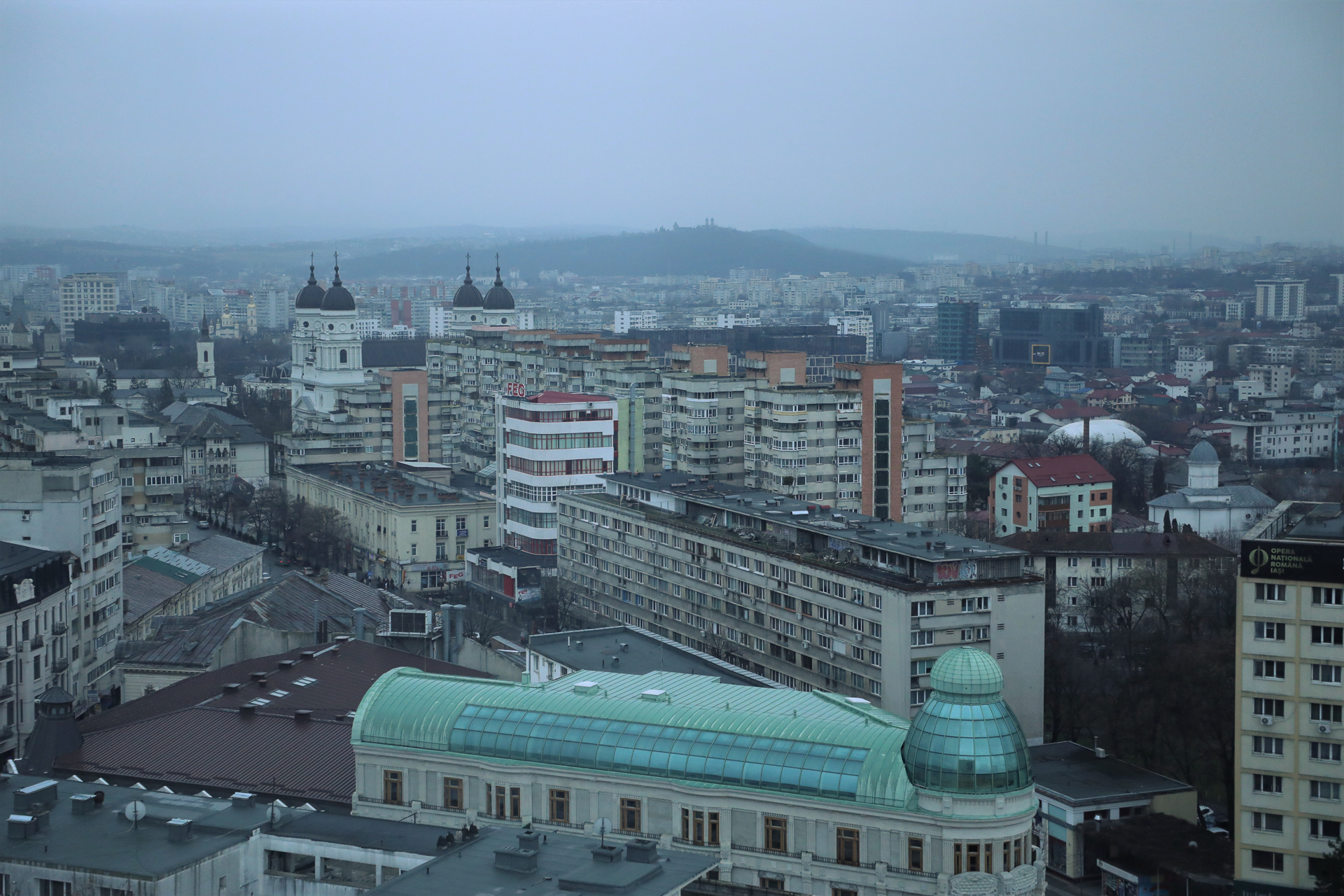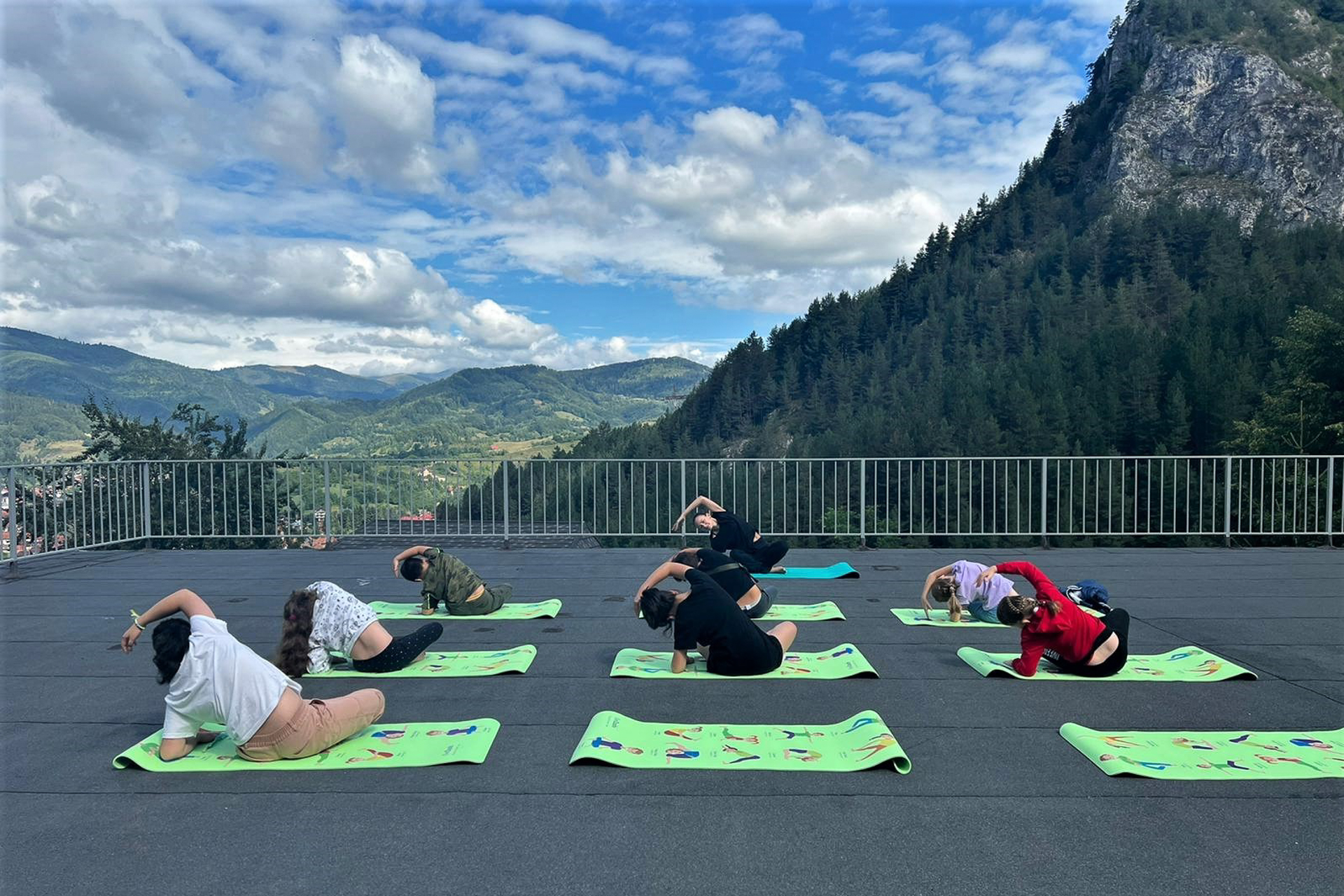It’s been a year of full-scale war in Ukraine and there doesn’t seem to be an end in sight. Millions of people are trying to pick up the pieces and recover. But with the attacks still in full force, they cannot help but wonder: how does one begin to move forward against the backdrop of pain and anguish?
Bucharest, 20 February 2023 – Anastasia* thought she was fine – until she wasn’t. She has been waiting at the bus station in downtown Iași, in northeastern Romania, for well over an hour. The 30-minute journey on Bus 6 now represents her daily commute between the city centre and the collective centre where she has been staying since the war started last year.
The 60-year-old had worked as an accountant for over 30 years, managing 13 different bank branches across Ukraine. Over the years, she became a widely respected figure among her peers, while a myriad of subordinates religiously followed her instructions.
Today, each time a bus pulls into the station, she looks up at the number but doesn’t recognize it anymore. She knows the numbers and she knows that she knows them. She has seen them many times before, and yet, they seem strange.
It’s not embarrassing to ask someone to explain something to you when you don’t know the language, she thinks. It’s not awkward to request support when you have a visual impairment, she knows. This, however, feels different.
Her bus comes and goes several times until she finally musters the courage to ask for help to identify the right bus. Having dealt with figures her entire life, the realization that her brain can’t tell a six from a seven has been a frightening one for Anastasia.

Anastasia has found a new home in Iași where she has been able to finally start processing her feelings related to the war in Ukraine. Photo: IOM/Monica Chiriac

MHPSS teams are constantly looking at new ways of improving their work and expanding it to other parts of the country. Photo: IOM/Monica Chiriac
Stories like Anastasia’s have become increasingly common in the midst of war as many have been forced to switch to survival mode and cling to any coping mechanism at hand.
“When the war started, everyone turned to psychologists as though we were gods,” recalls Ilona, a psychologist with the International Organization for Migration (IOM) in Iași. “Frankly, I felt powerless just like everybody else; it was like I had just seen Godzilla outside my window.”
In this digital day and age when every moment is captured on camera and shared online, many people found themselves glued to their TV and phone during the first few months of war to make sure that their loved ones were not among the victims and hoping for a resolution which failed to appear.
“It's like when you watch a horror movie: even if it scares you, you want to see how it ends, hoping there will be some redemption,” Ilona explains. “It's only later that you start processing what you watched.”
Many of those who fled still have family back in Ukraine while others just don’t feel ready to move on until it’s over, Ilona explains. ‘It’ has taken on many meanings since 24 February 2022, from being reunited with relatives or just knowing that they are safe, to the end of war or even rebuilding the country.
“We were told to stay strong, so most people have not allowed themselves to have a proper breakdown, to start processing their feelings or even have a good cry,” Ilona says.

At IOM’s office in Bucharest, the team of Ukrainian staff stands ready to assist all those looking for tailored assistance, including MHPSS services. Photo: IOM/Monica Chiriac

Together with IOM’s partner AIDRom, the Providența Polyclinic in Iași regularly organizes social and recreational activities for adults and children alike. Photo: IOM/Monica Chiriac
Ilona’s interest in psychology started a few years after her son was born and she realized that he had special needs. Now, she is grateful that as a student, when the situation first escalated in eastern Ukraine in 2014, she had the opportunity to participate in a study related to the psychological effects of war.
“I gained a lot of valuable knowledge, but it never crossed my mind that I would ever have to use it again,” she says. “I grew up thinking that war was a thing of the past.”
Negative emotions can emerge at the most unlikely times, sometimes even years after the event took place, she explains. These feelings can result in mood disorders which may impair the person’s ability to cope with social or family life and exacerbate the challenge of integrating into a new society.

IOM’s MHPSS teams often organize field trips, yoga, music classes, drama workshops, chess lessons and more. Photo: IOM
Attending various uplifting activities is one way of ensuring that people can address their feelings and start regulating their emotions. In Romania, IOM specialists facilitate informal education processes and socio-relational activities, group-based interventions, individual counselling sessions for adults and children, and psychotherapy sessions for children with special needs.
In coordination with relevant authorities, IOM refers people to specialized Mental Health and Psychosocial Support (MHPSS) services based on needs, ensuring that they are provided with interpretation services which will enable them to make an informed decision about their treatment.
“Though it is often treated as an afterthought, there can be no resilience and no recovery without the restoration of social connections, psychological stability and mental well-being, which are all strictly inter-connected,” explains Guglielmo Schininà, IOM’s Global Head of MHPSS programming.
“With that in mind, IOM mainstreams MHPSS in all the services it provides, and we will continue to do so, especially by strengthening national capacities within Ukraine and host countries,” he adds.
Through its activities, IOM aims to improve access to MHPSS services for both Ukrainians and third-country nationals residing in Romania.


IOM conducts group-based interventions as well recreational activities for children, among other activities. Photo: IOM
“In the beginning, many people were convinced that they would go back soon, but they have, in the meantime, realized that there isn’t much to go back to,” Ilona explains. “Nowadays, children in Ukraine meet up at gas stations to take their exams because they have no electricity at home.”
Ilona still conducts online sessions with some of her patients who stayed in Ukraine. She has noticed that many who were already suffering from different mental health issues are now struggling even more.
“People are different and respond differently to stressors,” she says. “Some seem to have made good progress through knitting while others have had to learn how to brush their teeth again.” Ilona is convinced that going through the motions and creating a semblance of a normal life is part of the recovery process.
“People need to be reminded what makes life worth living.”

Accepting the trauma and incorporating healthy habits is essential, Ilona thinks. Photo: IOM/Monica Chiriac
IOM’s MHPSS activities in Romania are possible thanks to its implementing partners, Schottener Foundation and AIDRom, and the support of the Government of Austria, US State Department’s Bureau of Population, Refugees, and Migration (PRM), and the Government of France.
If you are interested in donating to Ukraine relief efforts, please visit IOM's fundraising page.
*Name has been changed
Written by Monica Chiriac



